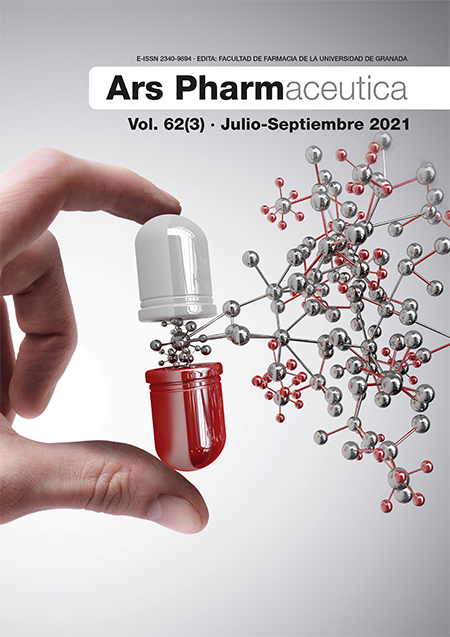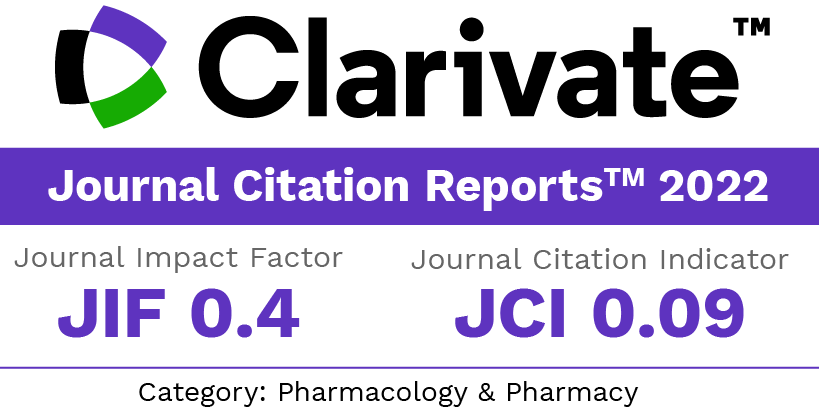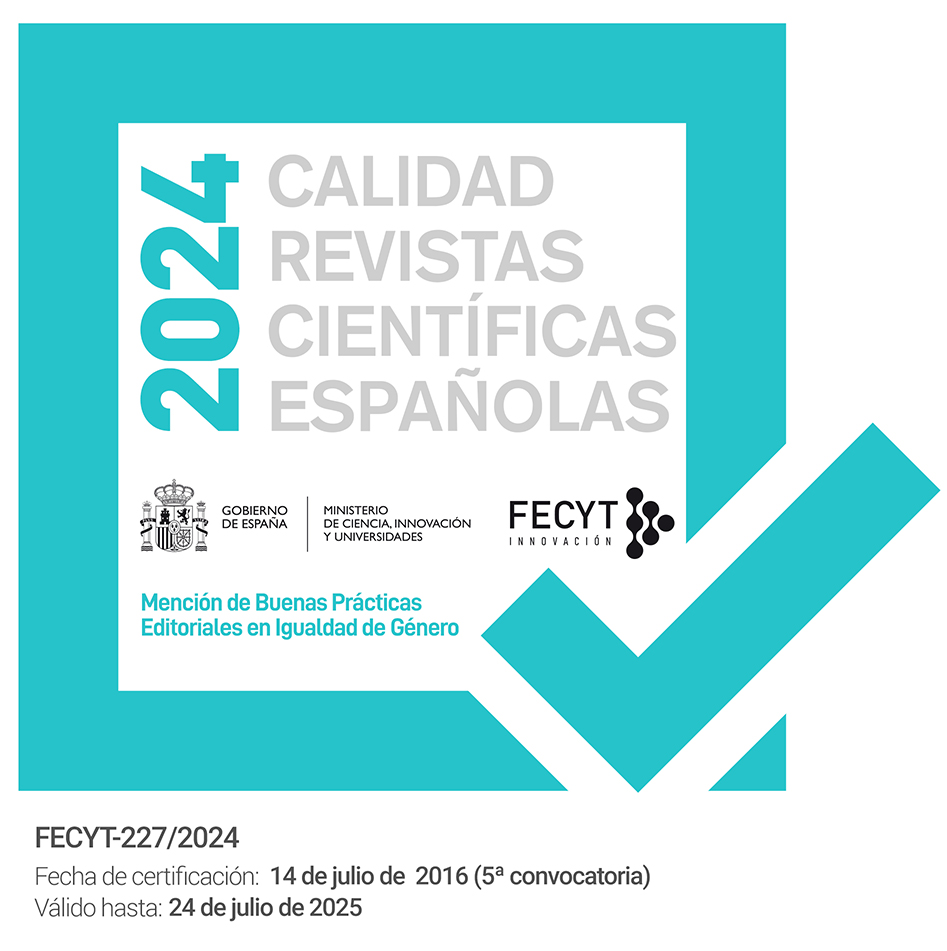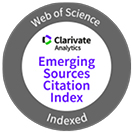Role-play for Pharmaceutical Care in the Pandemic COVID-19 as a teaching method for students of Pharmacy and Biochemistry
DOI:
https://doi.org/10.30827/ars.v62i3.17924Keywords:
Pharmaceutical Care, COVID-19, Role Play, Learning Technique, Pharmaceutical OfficeAbstract
Introduction: The COVID-19 pandemic has forced university education into an online distance learning mode. The Pharmaceutical Care in the COVID-19 pandemic, involves the intervention of the Pharmaceutical Chemist for user support in the delivery of the drug and accompaniment of the therapeutic from the Pharmaceutical Office, so the role-playing is part of a series of participatory strategies to specific events and is positive to encourage cooperative working skills in students.
Method: The design is experimental randomized controlled, with two teams as controls and one experimental team. Quantitative (scoring) and qualitative (satisfaction survey) data were pooled to determine the effect of role-play on students.
Results: The score was higher in the experimental team compared to the controls. The qualitative study of the experimental team shows students as satisfied with the process carried out, the teacher’s role, team performance, and the period set.
Conclusions: The use of role-play proved to be an important tool for teaching pharmaceutical care in virtual platforms during the COVID-19 pandemic, favouring the feed-back of knowledge and facilitating the assessment of students’ response and their reactions in the event environment according to social reality.
Downloads
References
Reglamento de Establecimientos Farmacéuticos. Decreto Supremo Nº 014-2011-SA. Normas Legales, El Peruano (27 de julio del 2011). Disponible en: http://www.digemid.minsa.gob.pe/Establecimiento/Documentos/DS_014-2011.pdf
Climente MM, Jiménez NT. Manual para la Atención Farmacéutica. 3a ed. Valencia: AFAHPE - Hospital Universitario Dr. Peset; 2005.
Protocolo para efectuar la Atención Farmacéutica en pacientes con sospecha de coronavirus “COVID-19” [Internet]. Lima: Colegio Químico Farmacéutico del Perú; c2020 – [consultado el 17 de marzo de 2021]. Disponible en: http://www.cqfp.pe/wp-content/uploads/2020/03/Protocolo-para-efectuar-la-atenci%C3%B3n-farmac%C3%A9utica-en-pacientes-con-sospecha-de-coronavirus-.pdf
Consejo General de Colegios Oficiales de Farmacéuticas. Información para Farmacéuticos – Coronavirus COVID-19. [Internet]. Madrid: Portalfarma; c2020 [consultado el 17 de marzo de 2021]. Disponible en: https://www.portalfarma.com/Profesionales/campanaspf/Asesoramiento-salud-publica/infeccion-coronavirus-2019-nCoV/Paginas/informacion-farmaceuticos.aspx
Faus MD, Amariles MP, Martínez MF. Atención Farmacéutica: conceptos, procesos y casos prácticos. 1a ed. Madrid: Ergón; 2008.
Hadley W, Houck C, Brown LK, Spitalnick JS, Ferrer M, Barker D. Moving Beyond Role-Play: Evaluating the Use of Virtual Reality to Teach Emotion Regulation for the Prevention of Adolescent Risk Behavior Within a Randomized Pilot Trial. J Pediatr Psychol. 2019 May 1; 44(4): 425-435. DOI: 10.1093/jpepsy/jsy092.
Latif R, Mumtaz S, Mumtaz R, Hussain A. A comparison of debate and role play in enhancing critical thinking and communication skills of medical students during problem based learning. Biochem Mol Biol Educ. 2018 Jul; 46(4): 336-342. DOI: 10.1002/bmb.21124.
Dawood E. Nursing Students’ Perspective about Role – Play as a Teaching Strategy in Psychiatric Nursing. JEP. 2013; 4(4): 38-48.
Lavanya SH, Kalpana L, Veena RM, Bharath VD. Role-play as an educational tool in medication communication skills: Students’ perspectives. Indian J Pharmacol. 2016 Oct; 48(1): S33-S36. DOI: 10.4103/0253-7613.193311.
Tobón ST, Jaik AD. Experiencias de aplicación de las competencias en la educación y el mundo organizacional. 1a ed. Durango: Red Durango de Investigadores Educativos A.C.; 2012.
Serrano JG, Pons RP. El constructivismo hoy: enfoques constructivistas en educación. REDIE. 2011 5 de abril; 13(1): 1-27.
Nair BT. Role play - An effective tool to teach communication skills in pediatrics to medical undergraduates. J Educ. Health Promot. 2019 Jan 29; 8(18): 1-10. DOI: 10.4103/jehp.jehp_162_18.
Manzoor I, Mukhtar F, Rahat NH. Medical Students’ Perspective about Role-Plays as A Teaching Strategy in Community Medicine. J Coll Physicians Surg Pak. 2012 Apr; 22(4): 222-225.
Singh K, Bhattacharyya M, Veerwal V, Singh A. Using Role-plays as an Empathy Education Tool for Ophthalmology Postgraduate. Int J Appl Basic Med Res. 2017 Dec; 7(1): S62–S66. DOI: 10.4103/ijabmr.IJABMR_145_17.
Larti N, Ashouri E, Aarabi A. The effect of an empathy role-play program for operating room nursing students. J Educ Health Prof. 2018 Dec 13; 15(29). DOI: 10.3352/jeehp.2018.15.29.
Zelaieta EA, Camino IO, Zulaika LI, Echeazarra IE. Juego de rol para el desarrollo del pensamiento crítico en la formación inicial del profesorado. RCED. 2019; 30(3): 729-745. DOI: 10.5209/rced.58884.
Gaete RQ. El juego de roles como estrategia de evaluación de aprendizajes universitarios. Educ Educ. 2011 mayo-agosto; 14(2): 289-307.
Herrera J. Los juegos: una alternativa creativa en la enseñanza de la Traumatología. Rev Educ Cienc Salud 2012; 9(1): 36-42.
Chan Z. Role-playing in the problema-based learning class. YNEPR. 2012 Jan; 12(1): 21-27. DOI: 10.1016/j.nepr.2011.04.008.
Comisión Económica para América Latina y el Caribe/Organización de las Naciones Unidas para la Educación, la Ciencia y la Cultura. La educación en tiempos de la pandemia de COVID-19 [internet]. Santiago: CEPAL/UNESCO; Informe COVID-19 CEPAL - UNESCO. Disponible en: https://repositorio.cepal.org/bitstream/handle/11362/45904/S2000510_es.pdf?sequence=1&isAllowed=y
Murillo F, Duk C. El Covid-19 y las Brechas Educativas. Rev Latinoam Educ Inclusiva. 2020 junio; 14(1): 11-13. DOI: 10.4067/S0718-73782020000100011
Negrin Y, Cárdenas L. Una mirada sobre la educación a distancia como opción en tiempos de pandemia. Edumecentro 2020; 12(3): 291-295.
Plataforma Digital Única del Estado Peruano. Coronavirus (COVID-19) en el Perú [Internet]. Lima: PDUEP; c2020. Disponible en: https://www.gob.pe/coronavirus.
Suárez XC, Castro NM, Muñoz CV. Use of Role Playing With Video Recording to Develop Interviewing Skills in Students of Psychology. Educare 2020; 24(2), 20-37. DOI: 10.15359/ree.24-2.2.
Ormazábal VV, Almuna FS, Hernández LM, Zúñiga FA. Juego de roles como método de enseñanza de Farmacología para estudiantes de la carrera de enfermería. Educ Med. 2019 Julio - Agosto; 20(4): 206 – 212. DOI: 10.1016/j.edumed.2018.07.001.
Dosso R. El juego de roles: Una opción didáctica eficaz para la formación en política y planificación turística. Aportes y Transferencias. 2009; 13(2): 11-28.
Al-Khalifa K, Nazir M. Evaluation of dental students’ responses to roleplay videos in a professionalism course. J Taibah Univ Med Sci. 2020 Dec; 15(6): 471–478. DOI: 10.1016/j.jtumed.2020.10.001.
Park KM, Ku J, Choi SH, Jang HJ, Park JY, Kim SI, et al. A virtual reality application in role-plays of social skills training for schizophrenia: a randomized, controlled trial. Psychiatry Res. 2011 Sep 30; 189(2): 166-172. DOI: 10.1016/j.psychres.2011.04.003
Ruiz GC. Covid-19: pensar la educación en un escenario inédito. RMIE. 2020 Junio; 25(85): 229-237.
Shankar PR, Piryani RM, Singh KK, Karki BM. Student feedback about the use of role-plays in Sparshanam, a medical humanities module. F1000Res. 2012 Dec 13; 1(65). DOI: 10.12688/f1000research.1-65.v1
Reguant MA, Torrado MF. El método Delphi. REIRE. 2016 Enero 07; 9(1): 87-102. DOI: 10.1344/reire2016.9.1916.
García RE, Arévalo CJ, Alcaraz GJ, Gallegos M, Alonso K, Ricardez CH. et al. Satisfacción de estudiantes en medicina con desempeño docente y tutorías académicas. Inv Educ Med. 2019; 8(30): 60-67. DOI: 10.22201/facmed.20075057e.2019.30.1891
Downloads
Published
How to Cite
Issue
Section
License
Copyright (c) 2021 Ars Pharmaceutica (Internet)

This work is licensed under a Creative Commons Attribution-NonCommercial-ShareAlike 4.0 International License.
The articles, which are published in this journal, are subject to the following terms in relation to the rights of patrimonial or exploitation:
- The authors will keep their copyright and guarantee to the journal the right of first publication of their work, which will be distributed with a Creative Commons BY-NC-SA 4.0 license that allows third parties to reuse the work whenever its author, quote the original source and do not make commercial use of it.
b. The authors may adopt other non-exclusive licensing agreements for the distribution of the published version of the work (e.g., deposit it in an institutional telematic file or publish it in a monographic volume) provided that the original source of its publication is indicated.
c. Authors are allowed and advised to disseminate their work through the Internet (e.g. in institutional repositories or on their website) before and during the submission process, which can produce interesting exchanges and increase citations of the published work. (See The effect of open access).























